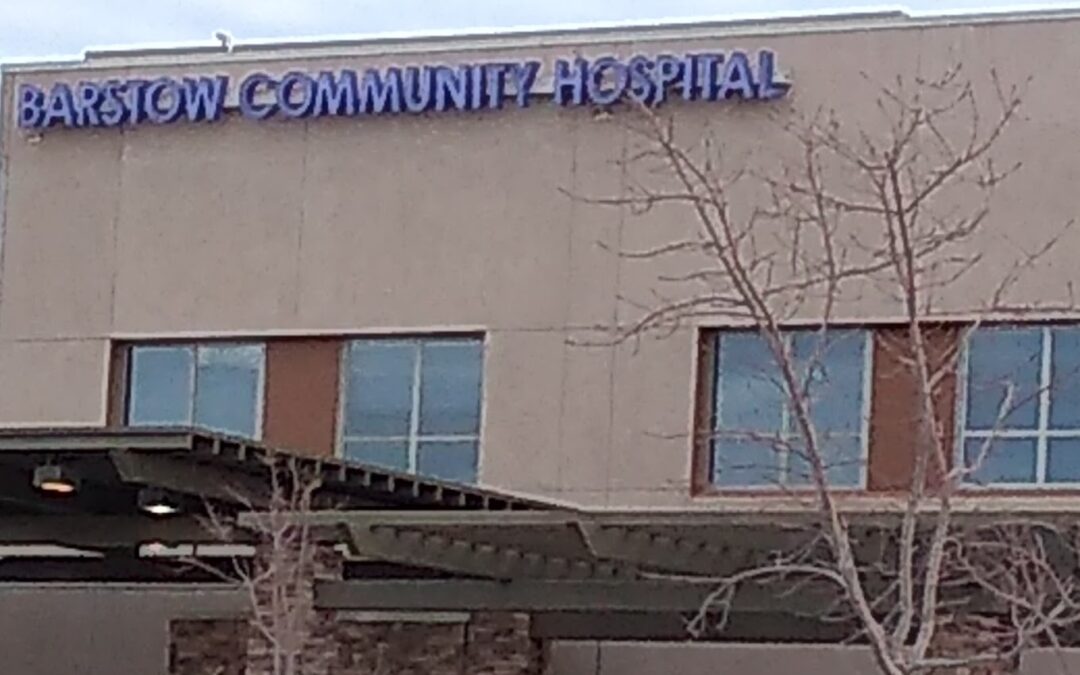By Paul Hughes
Dispatch Staff Writer
Betty Yancey had a choice when she gave birth to her daughter last December 28: give up crack cocaine or a government entity would take away the baby.
The woman who told her that, Carolyn Brooks, frightened her with the revelation. The baby tested positive at birth for the drugs her mother had ingested.
But Yancey found an ally in Brooks, former director of social services at Barstow Community Hospital, who lost her job in January when a new management firm laid off several workers.
Since then Brooks, an ordained minister and nurse, opened the Miracle Christian Center, an outreach program for people like Yancey who are addicted, out of work, homeless, or otherwise down on their luck.
Located at 123 E. Main St., between a bar and the Barstow Police Department substation, the nondescript, wood-paneled office is stocked with donated clothes, religious pamphlets with titles like, “I am the Way” and “God Loves You,” a piano and people willing to listen.
At the hospital, “I met a lot of people from down here and realized we were only treating a symptom,” said Brooks, who acknowledged that she could not relate to their problems until shortly before she lost her job.
Thanks to a physician at the hospital, Brooks began to see through their eyes. “He made me see it the way it was, and we started taking a closer look. The help would come by helping them feel good about themselves.”
People who wander aimlessly through life, unemployed and addicted to drugs and alcohol, lack self-esteem, Brooks said. Help them by providing counseling, clothes, perhaps a place to stay for the night, and assistance finding jobs, and they can be productive members of society, she said.
The transformation can be amazing. Take Yancey, for example. She has been coming to the center since it opened. On a recent afternoon, clad in a baby blue frock and a matching hat given to her at the center, the 31-year-old Barstow woman spoke at rapid pace, praising Brooks.
“She’s been a lot of help to a lot of people,” said Yancey, who is married and received help from Brooks finding an apartment. “She never says, ‘no.’ She’s as good as gold.”
Despite testing positive for drugs at birth, Yancey’s baby is healthy today.
“I had a choice. It was either drugs or my baby. I chose my baby.”
The center also offers Christian services, during which participants offer testimonials. One woman testified recently that she could “find where every crack house is in Barstow but she couldn’t find Thompson (Elementary) School to put her daughter in,” Brooks said.
At the time her 10-year-old daughter dressed like an adult, wore make up and wondered the streets.
The woman, Ezalia Moore, 32, said she had been in a rehabilitation program and decided to come to Barstow when she completed it. However, it was not long after she arrived that she began finding the drug houses and “it started over again.”
Brooks husband, who helps run the center, encountered Moore and invited her to a Sunday service. At the completion of the service, she was given a voucher for a room at a local motel.
“I had no intention of coming back, but I did, and I gave my heart to the Lord. – I was baptized immediately.”
“I couldn’t tell you six months ago if I died anyone would be at my funeral. Today, if I had no one else, my church would be there.”
Moore, who recently found a house to rent, walks four miles a day to be at the center.
After counseling, the center puts people like Moore to work, having them give back some of what they were given, Brooks said. Moore, for example, greets newcomers at the door and offers them words of encouragement. She and others also help clean and renovate the center and cook food.
“Many of these people are coming from generation after generation of people who didn’t do anything, who didn’t want to do anything,” said Brooks. “We’re holding up a picture and showing them that they can do something.”
The center, which generally opens between 9 and 10 a.m. and stays open until late afternoon, sometimes into the evening, serves as a place for those with nowhere else to go a place to sit and talk – and sit and not talk if they like.
A homeless man, casually dressed and clean shaven, came in one recent afternoon, a brown grocery bag full of items under one arm, politely asked to use the restroom, then went to the front of the office and sat by himself. Two hours later, he was still sitting.
He is a regular, Brooks said.
Another man who found the center also met his girlfriend there. During a recent Sunday service, he stood and proposed to her ion front of everyone. The wedding will be held in May.
The location of the center seems ideal. “We’re in the center of where we need to be,” Brooks said.
On a recent morning, a disheveled man sauntered from the south side of Main Street to the north, clutching a brown paper bag with a bottle inside in one hand. When he reached the other side, about a block from the center, he lifted the bag to his lips and took a drink.
“Hey, give me drink of that,” a woman at a nearby pay phone called out.
But Brooks said she does not recruit people to the center, nor can she guarantee that people who do seek help will kick their drug or alcohol habits.
“We’re not going to snatch anyone off the street. We haven’t done it yet and never will.”
The common problem facing all of the people she sees is poor self-esteem, which she calls a disease in itself.
“These people have the ‘I can’ts.’ They have been told they can’t. We’re telling them they can,” she said.
Ralph Bizzel, a Barstow police officer who works out of the substation next door to the center, said he often refers “hard core transients” to Brooks.
“It’s an establishment founded on religion, where people can go for spiritual needs,” he said. “They can go there and not feel like an outcast.”
Brooks said that, even as social services director at the hospital, she could not understand the problems of the homeless. Still, she always wanted to help.
Despite the loss of her job at the hospital, she has no plans to leave the center.
“There’s no time to be bitter about being laid off. I’m where I need to be.”

